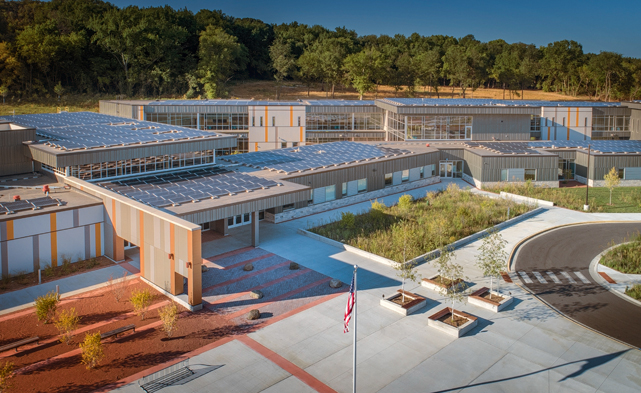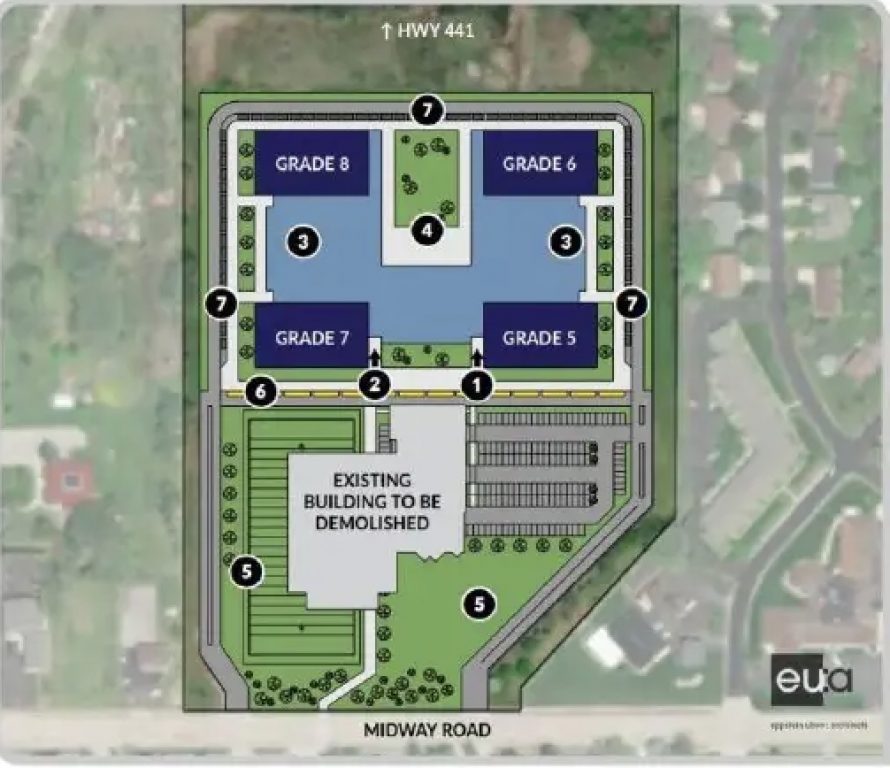2 Wisconsin Schools Moving to Net-Zero Energy
Dane County elementary school has achieved it, Fox Valley school plans to get there.

Forest Edge Elementary School uses 1,700 solar panels and 90 geothermal wells to produce renewable energy. (Photo courtesy Findorff)
In Dane County, Forest Edge Elementary students and teachers will soon return to what the New Buildings Institute called one of the largest “all-electric” buildings in North America.
And a middle school in the Fox Valley is hoping to open a similar school next year.
“We produce more (electricity) than the amount that we use in a year,” said Andy Weiland, business manager of the district.
“The building is continuing to perform really, really well,” he continued. “The mild winter that we had this last year actually helped us achieve net-zero a month early this year.”
On WPR’s “Wisconsin Today,” Weiland said the 126,000-square-foot building uses solar and geothermal energy to power its heating and cooling system.
“Humidity is controlled,” he said. “We got lots of fresh air coming in so far. The buildings performed really, really well for us.”
Weiland said the school has 1,700 solar panels on its roof and 90 geothermal wells about 400 feet underground. As a result, “We don’t have to burn any carbon-intensive fuels,” he said.
More than 100 miles north lies the Menasha Joint School District, where middle-school students will have the opportunity to experience its first “all-electric” building next year.

The new Maplewood Middle School will house 1,000 intermediate students (fifth and sixth grades) and middle school students (seventh and eighth grades). Photo courtesy of the Menasha Joint School District
Neenah-based company, Miron Construction is leading efforts to build a net-zero Maplewood Middle School. The company has built more than 90 geothermal heating and cooling systems, said Theresa Lehman, Miron’s director of sustainable services.
“(Maplewood’s) hot water system is tied to the geothermal system, as well as their walk-in coolers and freezers,” she said on “Wisconsin Today.” “The only gas that goes to that school is in the gas generator, which is just strictly for backup purposes only.”
“You’re able to garner the 55-degree temperature of the earth,” Lehman said. “It’s saving about 50 percent or more on annual energy utility bills.”
To construct the schools in Fitchburg and Menasha, both of their communities passed referendums.
In 2022, the Menasha Joint School District passed a $100 million referendum to construct Maplewood Middle School. In 2018, the Oregon School District passed a $40 million referendum.
“Our community kind of rallied around our board of education, who then took the leadership role and created a policy which asked an operational perspective and an educational perspective,” Weiland from the Oregon district said.
Weiland said community support is essential to building more net-zero schools in Wisconsin. This follows Gov. Tony Evers’ executive order to be carbon neutral by 2050.
Under the Inflation Reduction Act of 2022, school districts are able to claim federal tax credits for building clean energy buildings. Lehman said Menasha is hoping to receive $3 million in energy credits, which would “completely pay for their 1.3 megawatt solar system and their micro grid.”
“We submitted last month to the federal government with our first tax return to get that 30 percent money back for our solar panels,” he said.
In addition to tax credit benefits, Forest Edge students are learning more about the environment and sustainability.
Lehman said Miron is active in supporting the state’s environmental curriculum, which under the state Department of Public Instruction requires all K-12 schools to teach students 10 hours of environmental education a year.

Maplewood Middle School is expected to open next year. Photo courtesy of the Menasha Joint School District
Weiland said Forest Edge Elementary displays graphics throughout the building to teach kids about how energy is harvested by the sun.
Lehman added that she’s previously toured Forest Edge’s Elementary School and appreciates its approach to teaching students about energy.
“It’s refreshing for me to be able to see schools like Forest Edge. It’s amazing in terms of how they use their entire school as a teaching tool,” she said.
2 Wisconsin schools transition to net-zero energy, use tax credits to be more sustainable was originally published by Wisconsin Public Radio.
If you think stories like this are important, become a member of Urban Milwaukee and help support real, independent journalism. Plus you get some cool added benefits.




















